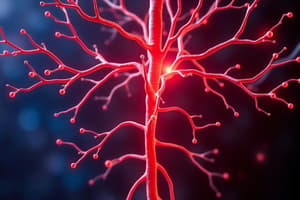Podcast
Questions and Answers
What type of neurotransmitter is secreted by preganglionic sympathetic neurons?
What type of neurotransmitter is secreted by preganglionic sympathetic neurons?
- Serotonin
- Dopamine
- Norepinephrine
- Acetylcholine (correct)
What defines preganglionic parasympathetic neurons?
What defines preganglionic parasympathetic neurons?
- They secrete epinephrine.
- They secrete acetylcholine. (correct)
- They secrete norepinephrine.
- They are known as adrenergic.
Which statement accurately describes both sympathetic and parasympathetic preganglionic neurons?
Which statement accurately describes both sympathetic and parasympathetic preganglionic neurons?
- Both are adrenergic.
- Both secrete acetylcholine. (correct)
- Both secrete norepinephrine.
- Both are involved in the fight or flight response.
What is a characteristic of cholinergic neurons?
What is a characteristic of cholinergic neurons?
Which of the following correctly identifies the neurotransmitter associated with preganglionic neurons?
Which of the following correctly identifies the neurotransmitter associated with preganglionic neurons?
What types of receptors do sympathetic postganglionic nerve endings primarily act on?
What types of receptors do sympathetic postganglionic nerve endings primarily act on?
Which statement best describes the action of sympathetic postganglionic nerve endings?
Which statement best describes the action of sympathetic postganglionic nerve endings?
Which of the following is NOT a characteristic of sympathetic postganglionic nerve endings?
Which of the following is NOT a characteristic of sympathetic postganglionic nerve endings?
What is the primary impact of sympathetic postganglionic nerve action on the cardiovascular system?
What is the primary impact of sympathetic postganglionic nerve action on the cardiovascular system?
When sympathetic postganglionic nerves are activated, what should be expected?
When sympathetic postganglionic nerves are activated, what should be expected?
Flashcards are hidden until you start studying
Study Notes
Autonomic Neurotransmitters
- Preganglionic sympathetic and parasympathetic neurons are cholinergic, meaning they release acetylcholine.
- Sympathetic postganglionic neurons mainly release norepinephrine, which acts on both alpha and beta receptors.
- Norepinephrine has a more potent pressor action on blood vessels in skeletal muscles and the liver, compared to other sites.
- Norepinephrine has a relaxing effect on the gastrointestinal tract.
Autonomic Agonist and Antagonist
- Agonists bind to a neurotransmitter's receptor and cause the same response as the neurotransmitter would.
- Salbutamol is a beta 2 agonist, acting as a bronchodilator.
- Antagonists bind to receptors, preventing the neurotransmitter from binding and causing a response.
- Atropine blocks the effect of acetylcholine on muscarinic receptors, suppressing parasympathetic effects. It is used to suppress salivation and bronchial secretion before surgery.
- Metaprolol selectively blocks beta 1 receptors, used to treat high blood pressure. Beta 1 receptors are primarily found in the heart.
Regions of CNS Involved in Control of Autonomic Activities
- The hypothalamus plays a crucial role in integrating autonomic, somatic, and endocrine responses associated with emotions and behaviors.
- The medulla within the brainstem directly controls autonomic output, including cardiovascular and respiratory centers.
- Spinal cord level integrates some autonomic reflexes, such as urination, defecation, and erection.
Studying That Suits You
Use AI to generate personalized quizzes and flashcards to suit your learning preferences.




